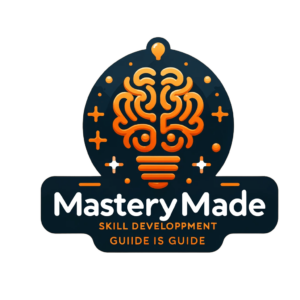We all aspire to enhance our lives, both personally and professionally, by acquiring new skills. Yet, the journey to Skill Learning Mastery isn’t always easy or swift. What if there were methods to fast skill acquisition that could revolutionize the way we learn? Unveiling these game-changing strategies is what we’ll dive into, promising to arm you with the techniques necessary to learn new skills not in years, decades, or months, but potentially in a matter of weeks or days.
The key to unlocking our learning potential lies not in sticking stubbornly to the old paths but in forging new ones, ones that promise not just enlightenment, but also speed. Together, let’s explore these hidden avenues and learn how to absorb and apply new knowledge at an amazing pace!
Key Takeaways
- Uncovering speedier pathways to learn new skills can revolutionize personal and professional growth.
- Acknowledging the potential of novel and efficient skill acquisition strategies to boost learning.
- Expanding skillsets at an accelerated rate by tapping into lesser-known methods of Skill Learning Mastery.
- Moving beyond traditional learning techniques to discover faster, more effective ways to develop skills.
- Embracing innovative approaches that challenge conventional learning for more rapid skill advancement.
- Collaborative exploration of transformative techniques that enable us to master new skills swiftly.
Understanding the Fundamentals of Fast Skill Acquisition
Embarking on the journey to improve skills requires a solid foundation in the principles of efficient skill learning. This core understanding is essential for anyone looking to develop skills rapidly and effectively. Before we delve into the intricacies of skill acquisition, it’s important to grasp that this process is both an art and a science.
Breaking Down Complex Skills into Manageable Parts
We often view complex skills as monolithic challenges, but the key to overcoming this is by breaking them down into smaller, digestible parts. This strategy allows us to tackle one aspect at a time, leading to more focused and sustainable improvements. For instance, learning a new language can be segmented into vocabulary, grammar, and pronunciation, with each part receiving dedicated attention.
Utilizing Mental Models for Better Retention
Mental models serve as frameworks to enhance our understanding and retention of new information. They enable us to create connections between the various components of a skill, facilitating a deeper engagement with the material. By using analogies and metaphors, we transform abstract concepts into tangible examples, thus simplifying the learning curve.
The Role of Cognitive Science in Learning
Having an appreciation for cognitive science is like having a roadmap for the mind during the skill acquisition process. Recognizing how our brains process and store information can dramatically augment our approach to learning new skills. It’s about leveraging techniques like spaced repetition and varied practice to harness the full potential of our cognitive capabilities.

| Concept | Description | Benefit |
|---|---|---|
| Deconstruction | Dividing a skill into sub-skills for targeted practice | Clearer learning objectives and milestones |
| Mental Models | Frameworks for understanding and applying information | Improved retention and application of skills |
| Cognitive Science Techniques | Applying scientific insights to optimize learning | Enhanced memory and faster skill mastery |
Our aim in this exploration is to provide actionable insights that propel you toward success in your personal and professional skill development journeys. As we move forward, remember that an informed approach, coupled with the dedication to practice, is the cornerstone of fast and efficient skill learning.
Incorporating Unconventional Skill Mastery Techniques
As we delve into the world of learning, it’s crucial to recognize that traditional methods don’t always cut it. Today, we’re going to explore several skill mastery techniques that are unconventional yet incredibly effective. These are not your average study tips; they are transformative approaches designed to develop mastery in ways that may surprise you.

Let’s break down these techniques with a detailed analysis:
| Technique | Description | Benefit |
|---|---|---|
| Interleaved Practice | Mixing different topics or skills in practice sessions | Enhances problem-solving and the ability to apply knowledge in various contexts |
| Self-Explanation | Explaining concepts or solutions to oneself to clarify understanding | Improves retention and solidifies comprehension |
| Learning by Teaching | Educating others on the subject matter as a means to learn | Reinforces knowledge and exposes gaps in understanding |
One of the most remarkable aspects of these skill mastery techniques is their basis in cognitive science. For instance, interleaved practice forces the brain to differentiate between varying scenarios and adapt its use of techniques to the relevant context. It’s a step away from the monotony of repetition, proving to be a more rigorous and ultimately more potent method of cementing skills.
- Interleaved Practice – Not doing the same thing repeatedly but mixing it up to create a challenging learning environment.
- Self-Explanation – Articulating your thought process to identify where you might have gaps in your knowledge.
- Learning by Teaching – It’s said that you never truly understand something until you can teach it to someone else.
It’s this approach to learning that can help us push past plateaus. When we explore, challenge, and ultimately reshape our understanding, we aren’t just learning—we’re transforming the way we think. These unconventional paths are not just about gaining knowledge; they’re about creating a foundation for lifelong skill mastery.
Remember, the aim is not to learn for the sake of learning, but to develop a mastery that will serve you endlessly in your personal and professional life.
Now it’s our turn to put these methods into action. As we practice and reflect on our progress, we’ll find ourselves not only mastering skills, but also mastering the art of learning itself. So let’s embrace these unconventional techniques, step out of our comfort zones, and watch ourselves grow beyond what we thought possible.
Optimizing Your Learning Environment for Skill Mastery
As we venture deeper into the realms of acquiring new competencies, it becomes imperative to optimize our surroundings to galvanize the learning process. A well-crafted environment is the backbone of effective skill learning strategies, ensuring that we master a new skill with greater efficiency and less friction. Let’s explore the pillars that constitute an ideal learning habitat.
Configuring a Distraction-Free Space
Our first anchor is establishing a sanctuary of concentration. This means eliminating clutter, noise, and interruptions that might impede our focus. A minimalist setting can significantly sharpen our cognitive functions, leaving us primed for absorbing new information.
- Choose a quiet area
- Organize your resources beforehand
- Limit digital and physical distractions
The Impact of a Supportive Community
Human beings are inherently social creatures. A nurturing community not only bolsters our emotional resilience but also fosters a collaborative environment where knowledge exchange accelerates our learning curves. Such a community might include mentors, peers, or even online forums dedicated to skill mastery.
- Engage with skill-specific networks
- Participate in group learning sessions
- Seek feedback and support regularly
Leveraging Technology for Enhanced Learning
Finally, let us harness the power of technology to turbocharge our training. From sophisticated learning management systems to simple organizational apps, tech is a potent ally in mapping out our skill acquisition journey.
| Tool | Purpose | Benefit |
|---|---|---|
| Interactive Tutorials | Hands-on practice | Real-time skill application |
| Educational Platforms | Structured Learning | Comprehensive curriculum coverage |
| Productivity Apps | Time Management | Efficient learning schedule |
By combining these elements, we fortify our learning sphere, making it fertile ground for skill development. Integrating proactive strategies into our routine can dramatically uplift our ability to master a new skill. Embrace these tactics, and watch as they transform your skill learning experience.
Skill Learning Mastery
As we navigate through our journey of Skill Learning Mastery, our overarching goal is to equip you with an array of skill learning strategies that have been synthesized into a singular, robust framework. The focus here is not just on acquiring skills but mastering them with an adeptness that allows for versatility and adaptability in any learning situation.
We believe in the philosophy that mastering a new competency should not be seen as a lofty, distant goal but rather an accessible reality. With the methodologies we’ve compiled, including incremental learning, dedicated practice, and reflective processing, our pursuit of fast skill acquisition becomes a straightforward path lined with measurable milestones and achievable targets.
Take a moment to absorb the insights encapsulated in the infographic above. Through strategic planning and deliberate practice, each step contributes to a larger blueprint for skill mastery. Learning a skill effectively involves understanding the components that make it up, which can be mastered in succession, leading to a comprehensive grasp of the entire skill set.
| Technique | Application | Outcome |
|---|---|---|
| Deconstruction | Breaking skills down into sub-skills | Manages complexity and enhances focus on specific areas |
| Spaced Repetition | Regular intervals of review and practice | Improves retention and long-term recall |
| Focused Practice | Intense, uninterrupted practice sessions | Deepens proficiency and accelerates skill refinement |
| Feedback Loops | Active seeking and application of feedback | Provides direction for improvement and accelerates progression |
By integrating these elements into your practice, you’re not just learning, you’re mastering. It’s through this detailed approach that we witness a revelation in our ability to grasp new concepts rapidly and thoroughly. Each technique offers a distinct advantage that, when combined, formulates a robust strategy for any learner aiming to achieve Skill Learning Mastery in their field.
Let us embrace these strategies with open minds and diligent efforts, fully immersing ourselves in the process of learning. As we execute these strategies, we lay down the foundation for a lifetime of continuous growth and development. The mastery we seek is more than a destination; it’s a continuously evolving journey marked by the persistence to never stop refining our skills and the dedication to always push beyond the boundaries of our capabilities.
Conclusion
As we inch towards the end of this insightful discourse, we are reminded of the pivotal role that a commitment to continual learning and a robust growth mindset play in the realm of skill development. The strategies highlighted through this journey are not mere suggestions; they are stepping stones on the path to skill mastery. Each technique underscores the intrinsic value of nurturing our abilities and the profound impact of transformative learning on our professional and personal lives.
Continual Learning and Growth Mindset
To improve skills is to embrace an ongoing process that defies the finality of perfection. The notion of a growth mindset is not just an educational theory but a practical approach to life that galvanizes our endeavors to develop mastery. Whether we are artists mastering brushstrokes, programmers coding for a digital future, or entrepreneurs charting unknown territories, the essence of a growth mindset is the engine that drives our pursuit of excellence.
Personal Reflection on Skill Learning Mastery
Our shared journey through the nuances of skill learning mastery has not only equipped us with novel techniques for expedited learning but has also illuminated the philosophies that sustain long-term growth. As we reflect on these learnings, we find an alignment with our inner drive to advance—to continuously evolve and adapt in a rapidly-changing world. Let these guiding principles, backed by cognitive science and innovative educational psychology, fuel our aspirations to forge ahead, keen on self-improvement and eager to conquer the next pinnacle of our skill development.
FAQ
What are some lesser-known techniques to accelerate skill learning mastery?
Techniques such as breaking down complex skills into smaller, manageable parts, using mental models for better retention, and applying cognitive science principles to understand how the brain learns can significantly expedite skill acquisition.
How can cognitive science contribute to efficient skill learning?
Cognitive science can help us understand the mechanisms of our brain concerning learning and memory. By leveraging this knowledge, we can develop strategies tailored to how the brain best absorbs and retains new information, making skill learning more efficient.
What unconventional skill mastery techniques can help me learn faster?
Techniques such as using immersive learning experiences, engaging in deliberate practice, applying the Pareto principle (80/20 rule), and learning through teaching are some unconventional methods that can enhance the speed of skill mastery.
Why is configuring a distraction-free space important for mastering new skills?
A distraction-free space helps maintain focus and concentration, which are crucial for deep learning. It minimizes interruptions and allows the brain to form stronger connections, thus facilitating better skill retention and mastery.
How does a supportive community affect my ability to master a new skill?
A supportive community can provide motivation, feedback, and a sense of accountability. It can also offer different perspectives and insights that can help overcome challenges and stimulate continued learning and improvement.
What role does technology play in enhancing the learning process for new skills?
Technology acts as a tool that can provide access to a vast array of resources, enable personalized learning experiences, and facilitate practice through simulations and interactive platforms. It can make learning more engaging and efficient.
Can you explain the Skill Learning Mastery framework?
The Skill Learning Mastery framework is an approach that integrates several learning techniques and strategies to optimize the process of acquiring and mastering new skills. It emphasizes on efficient learning methods, optimizing the learning environment, leveraging technology, and building supportive communities to facilitate fast skill acquisition.
How important is continual learning and a growth mindset in skill development?
Continual learning and a growth mindset are vital in skill development as they encourage persistence, adaptability, and openness to new experiences. They help individuals to embrace challenges, learn from mistakes, and stay committed to lifelong learning and self-improvement.











